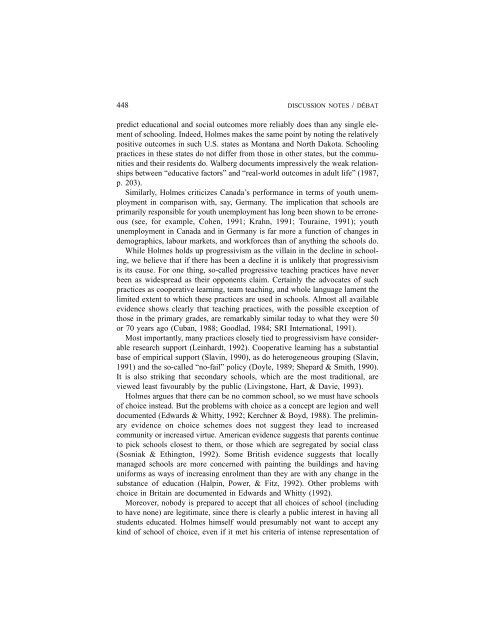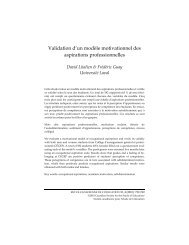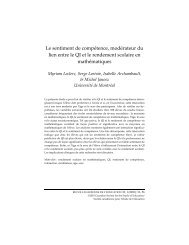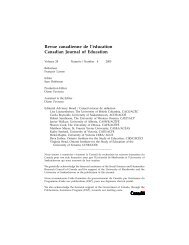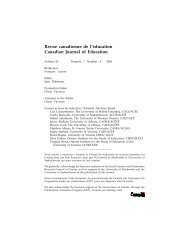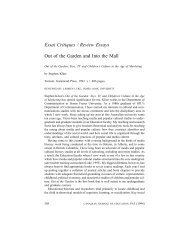Mireille Falardeau et Michel Loranger Le choix de stratégies ... - CSSE
Mireille Falardeau et Michel Loranger Le choix de stratégies ... - CSSE
Mireille Falardeau et Michel Loranger Le choix de stratégies ... - CSSE
You also want an ePaper? Increase the reach of your titles
YUMPU automatically turns print PDFs into web optimized ePapers that Google loves.
448 DISCUSSION NOTES / DÉBAT<br />
predict educational and social outcomes more reliably does than any single element<br />
of schooling. In<strong>de</strong>ed, Holmes makes the same point by noting the relatively<br />
positive outcomes in such U.S. states as Montana and North Dakota. Schooling<br />
practices in these states do not differ from those in other states, but the communities<br />
and their resi<strong>de</strong>nts do. Walberg documents impressively the weak relationships<br />
b<strong>et</strong>ween “educative factors” and “real-world outcomes in adult life” (1987,<br />
p. 203).<br />
Similarly, Holmes criticizes Canada’s performance in terms of youth unemployment<br />
in comparison with, say, Germany. The implication that schools are<br />
primarily responsible for youth unemployment has long been shown to be erroneous<br />
(see, for example, Cohen, 1991; Krahn, 1991; Touraine, 1991); youth<br />
unemployment in Canada and in Germany is far more a function of changes in<br />
<strong>de</strong>mographics, labour mark<strong>et</strong>s, and workforces than of anything the schools do.<br />
While Holmes holds up progressivism as the villain in the <strong>de</strong>cline in schooling,<br />
we believe that if there has been a <strong>de</strong>cline it is unlikely that progressivism<br />
is its cause. For one thing, so-called progressive teaching practices have never<br />
been as wi<strong>de</strong>spread as their opponents claim. Certainly the advocates of such<br />
practices as cooperative learning, team teaching, and whole language lament the<br />
limited extent to which these practices are used in schools. Almost all available<br />
evi<strong>de</strong>nce shows clearly that teaching practices, with the possible exception of<br />
those in the primary gra<strong>de</strong>s, are remarkably similar today to what they were 50<br />
or 70 years ago (Cuban, 1988; Goodlad, 1984; SRI International, 1991).<br />
Most importantly, many practices closely tied to progressivism have consi<strong>de</strong>rable<br />
research support (<strong>Le</strong>inhardt, 1992). Cooperative learning has a substantial<br />
base of empirical support (Slavin, 1990), as do h<strong>et</strong>erogeneous grouping (Slavin,<br />
1991) and the so-called “no-fail” policy (Doyle, 1989; Shepard & Smith, 1990).<br />
It is also striking that secondary schools, which are the most traditional, are<br />
viewed least favourably by the public (Livingstone, Hart, & Davie, 1993).<br />
Holmes argues that there can be no common school, so we must have schools<br />
of choice instead. But the problems with choice as a concept are legion and well<br />
documented (Edwards & Whitty, 1992; Kerchner & Boyd, 1988). The preliminary<br />
evi<strong>de</strong>nce on choice schemes does not suggest they lead to increased<br />
community or increased virtue. American evi<strong>de</strong>nce suggests that parents continue<br />
to pick schools closest to them, or those which are segregated by social class<br />
(Sosniak & Ethington, 1992). Some British evi<strong>de</strong>nce suggests that locally<br />
managed schools are more concerned with painting the buildings and having<br />
uniforms as ways of increasing enrolment than they are with any change in the<br />
substance of education (Halpin, Power, & Fitz, 1992). Other problems with<br />
choice in Britain are documented in Edwards and Whitty (1992).<br />
Moreover, nobody is prepared to accept that all choices of school (including<br />
to have none) are legitimate, since there is clearly a public interest in having all<br />
stu<strong>de</strong>nts educated. Holmes himself would presumably not want to accept any<br />
kind of school of choice, even if it m<strong>et</strong> his criteria of intense representation of


